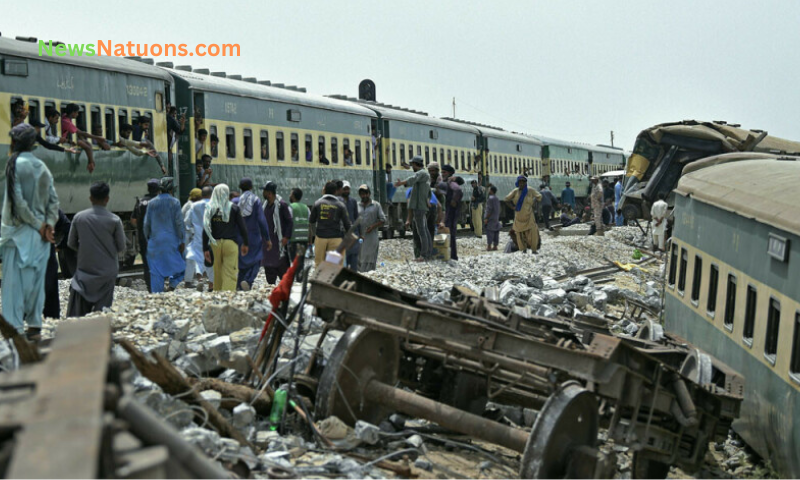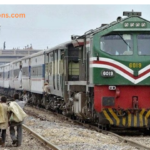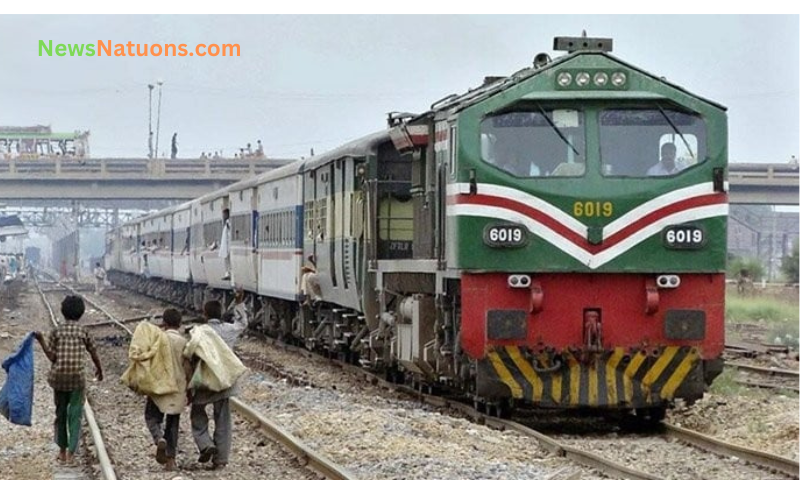In what has become a deeply concerning trend, accidents within Pakistan Railways have become disturbingly frequent. Once considered a backbone of affordable transport across the country, the railway system now faces repeated technical failures and safety breaches that put the lives of thousands at risk every day. The latest accident involving the Karachi Express has once again highlighted the dangerous state of Pakistan’s rail infrastructure.
Karachi Express Derails Near Karachi City Station
On yet another unfortunate morning, passengers aboard the Karachi Express were thrown into panic as one of the train’s coaches derailed near Karachi City Station. According to details, the coach went off track just moments before it could stop at the platform. Although the speed was reduced, the sudden jolt caused several passengers to fall violently to the ground.
Thankfully, no lives were lost this time, but the fear and shock experienced by passengers cannot be ignored. The incident occurred despite the train operating at a low speed, further proving how vulnerable the system has become even during routine operations.
Sixth Incident in Just One Week
What is even more troubling is that this was not an isolated incident. This derailment marks the sixth train accident in just one week. According to railway insiders and transport authorities, four of these accidents occurred between Karachi and Hyderabad, a highly trafficked corridor that is now becoming infamous for its safety lapses.
The frequency of these incidents is not only alarming but paints a grim picture of the future if swift reforms are not introduced. Commuters who rely on trains for daily or long-distance travel now feel unsafe, unsure of whether their journeys will end in tragedy.
Ageing Infrastructure and Lack of Maintenance
One of the core issues behind the rise in railway accidents is the lack of proper maintenance and modernization. Many of the coaches and engines currently in operation are decades old, operating on outdated technology and worn-out components. A crucial aspect that has come under scrutiny is the Periodic Overhauling (POH) of rolling stock.
According to sources within Pakistan Railways, many coaches have not undergone POH in years, which includes essential maintenance like replacing wheels, testing brake systems, and inspecting suspension mechanisms. Without regular POH, these trains become ticking time bombs on the tracks.
Human Error and Poor Oversight
While technical faults play a major role, human negligence cannot be ignored. There have been instances where poor communication between signal stations, misjudgments by train drivers, or delays in track maintenance have led to severe accidents. Moreover, Pakistan Railways lacks a modern automated monitoring system that could help detect faults in real-time, allowing authorities to take preemptive action.
The management’s response to such accidents has often been slow and ineffective. Inquiry committees are formed, but their findings rarely lead to significant changes or accountability. The public is left waiting for justice or even reassurance that future incidents will be prevented.
Public Reaction and Social Media Outcry
As with previous incidents, social media platforms quickly picked up the news of the derailment. Hashtags related to train safety in Pakistan began trending, with users expressing their frustration and calling for the resignation of railway officials. Many users pointed out that train travel, once a budget-friendly and scenic mode of transportation, has now turned into a dangerous gamble.
Families of passengers, civil society activists, and even former railway employees have raised questions about the current state of management and resource allocation within the railway department.
Impact on National Confidence in Railways
These repeated incidents have severely impacted public confidence in Pakistan Railways. With rising inflation, most citizens cannot afford air travel and rely on trains as the only viable alternative for intercity commuting. However, the current pattern of accidents is likely to push people away from train travel altogether, resulting in lower revenue for the department and more pressure on road networks.
At a time when many countries are investing in high-speed rail and automated train systems, Pakistan is still struggling to maintain its basic railway operations.
What Needs to Change?
To restore confidence and ensure safety, immediate reforms are necessary. These should include urgent POH of all operational coaches, increased investment in track repairs, and adoption of modern train safety technology. The introduction of automated signaling systems, AI-based monitoring, and GPS tracking for trains can help minimize human error and improve safety protocols.
Equally important is accountability. Railway officials must be held responsible for negligence, and a transparent system should be introduced where accident reports and findings are made public. Only by accepting the flaws and taking tangible steps can Pakistan Railways regain its lost trust.
پاکستان ریلویز میں حادثات کا سلسلہ معمول بن چکا ہے۔ کبھی سستی اور قابل اعتماد سواری کے طور پر جانے جانے والے ریلوے نظام کو اب سنگین حفاظتی خدشات اور تکنیکی ناکامیوں کا سامنا ہے۔ کراچی ایکسپریس کے حالیہ حادثے نے ایک بار پھر ہمارے ریلوے نظام کی بدترین حالت کو عیاں کر دیا ہے۔
کراچی ایکسپریس کراچی سٹی اسٹیشن کے قریب پٹری سے اتر گئی
آج صبح کراچی ایکسپریس کی ایک بوگی کراچی سٹی اسٹیشن کے قریب پلیٹ فارم سے کچھ ہی فاصلے پر پٹری سے اتر گئی۔ حادثے کے وقت ٹرین کی رفتار نسبتاً کم تھی، لیکن جھٹکا اتنا شدید تھا کہ کئی مسافر زمین پر گر پڑے۔ خوش قسمتی سے کوئی جانی نقصان نہیں ہوا، لیکن یہ حادثہ مسافروں کے لیے ایک خوفناک تجربہ تھا۔
یہ حادثہ اس حقیقت کی طرف اشارہ کرتا ہے کہ اب ہمارے ٹرینوں میں معمول کی سواری بھی خطرے سے خالی نہیں رہی۔
ایک ہفتے میں چھٹا حادثہ
مزید تشویش کی بات یہ ہے کہ یہ حادثہ گزشتہ ایک ہفتے کے دوران پیش آنے والا چھٹا حادثہ ہے۔ چار بڑے حادثے صرف کراچی اور حیدرآباد کے درمیان کے علاقے میں پیش آئے ہیں۔ اس راستے پر مسافر ٹرینوں کی آمدورفت مسلسل جاری رہتی ہے، لیکن اب یہ راستہ حادثات کا مرکز بن چکا ہے۔
یہ صورتحال ظاہر کرتی ہے کہ اگر فوری اقدامات نہ کیے گئے تو یہ سانحات مزید بڑھ سکتے ہیں۔
پرانی بوگیاں اور ناقص دیکھ بھال

پاکستان ریلوے میں حادثات کی ایک بڑی وجہ پرانی بوگیاں اور دیکھ بھال کی کمی ہے۔ ریلوے کا زیادہ تر نظام پرانا اور فرسودہ ہو چکا ہے۔ ایک اہم مسئلہ پی او ایچ (Periodic Overhauling) کا ہے، جو کہ عرصہ دراز سے نہیں کیا گیا۔
ریلوے حکام کے مطابق کئی بوگیاں ایسی ہیں جنہیں برسوں سے مکمل معائنے کے لیے ورکشاپ نہیں بھیجا گیا۔ اس میں بریک سسٹم، پہیوں اور سسپنشن کا مکمل چیک اپ شامل ہوتا ہے۔ بغیر پی او ایچ کے یہ گاڑیاں حرکت کرتے بموں کی مانند ہیں۔
انسانی غلطی اور ناقص نگرانی
تکنیکی خرابی کے ساتھ ساتھ انسانی غلطیاں بھی کئی حادثات کا باعث بن چکی ہیں۔ بعض اوقات سگنل اسٹیشن کے درمیان رابطے میں کوتاہی، ڈرائیور کی غلطی یا ٹریک کی بروقت مرمت نہ ہونے کے باعث حادثات پیش آتے ہیں۔ پاکستان ریلوے کے پاس ابھی تک جدید خودکار مانیٹرنگ سسٹم موجود نہیں جو فوری خرابی کو پہچان سکے۔
ریلوے انتظامیہ کی جانب سے اکثر حادثات کے بعد ردعمل سست اور غیر مؤثر رہا ہے۔ تحقیقات ہوتی ہیں لیکن ان کے نتائج عوام کے سامنے نہیں آتے اور نہ ہی کوئی ٹھوس قدم اٹھایا جاتا ہے۔
عوامی ردعمل اور سوشل میڈیا پر غصہ
حادثے کی خبر کے بعد سوشل میڈیا پر عوام نے شدید غم و غصے کا اظہار کیا۔ صارفین نے حکام کی نااہلی پر سوالات اٹھائے اور کئی افراد نے وزیر ریلوے کے استعفے کا مطالبہ کیا۔ سوشل میڈیا پر کئی افراد نے لکھا کہ پاکستان میں ریل کا سفر اب صرف سستا نہیں بلکہ جان لیوا بھی بن چکا ہے۔
پاکستان ریلویز پر اعتماد کم ہوتا جا رہا ہے
بار بار پیش آنے والے حادثات نے پاکستان ریلویز پر عوامی اعتماد کو بری طرح متاثر کیا ہے۔ مہنگائی کے اس دور میں جب زیادہ تر لوگ ہوائی سفر کا خرچہ نہیں اٹھا سکتے، ٹرین ہی ایک آسان ذریعہ تھی۔ لیکن موجودہ صورتحال میں لوگ اس آپشن کو بھی چھوڑنے پر مجبور ہو رہے ہیں۔
فوری اصلاحات کی ضرورت
ریلوے کی حالت سدھارنے کے لیے فوری اقدامات ناگزیر ہیں۔ تمام فعال بوگیوں کا پی او ایچ فوری مکمل کیا جائے، پٹریوں کی مرمت اور سگنل سسٹم کو اپ گریڈ کیا جائے، اور خودکار حفاظتی نظام متعارف کرایا جائے۔
اسی کے ساتھ ذمہ داری کا تعین ضروری ہے۔ جو اہلکار غفلت برتیں انہیں سزا دی جائے، اور ہر حادثے کی رپورٹ عوام کے سامنے لائی جائے۔ صرف ٹھوس اقدامات اور شفافیت کے ذریعے ہی پاکستان ریلویز کھویا ہوا اعتماد واپس حاصل کر سکتی ہے۔











